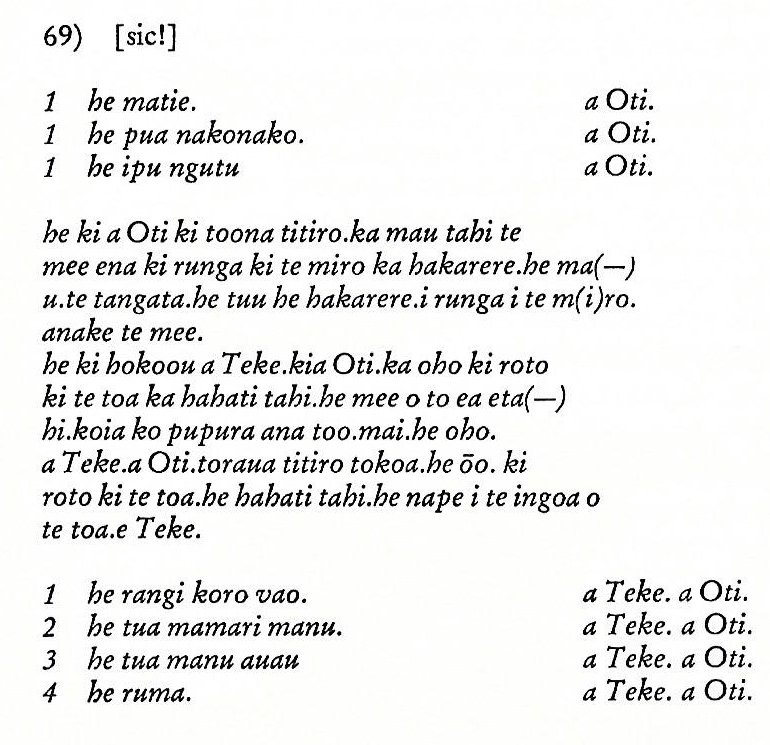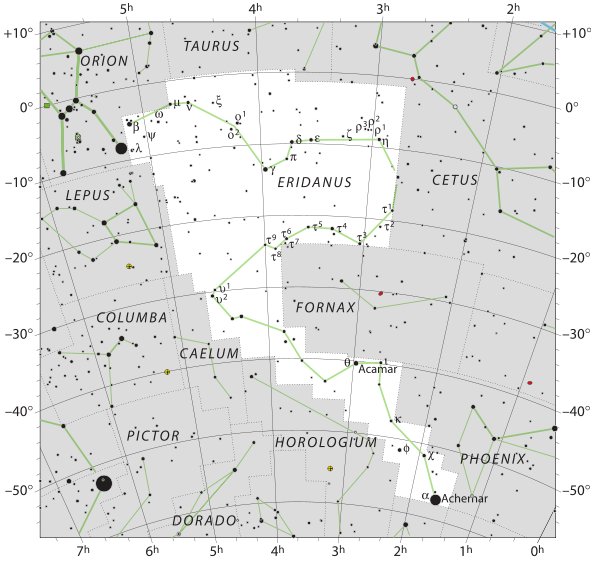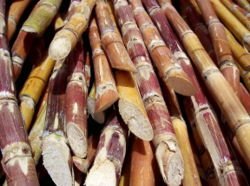Above are 2 + 21 = 23 trees, grasses, ferns, and other plants. But he nehenehe a Oti is mentioned twice. 23 - 1 = 22. Furthermore, hauhau and mahute have not been attributed to Oti → 22 - 2 = 20. Of these 20 there were 8 kinds of trees marked with a dot (coloured magenta by me).
Ragi. Ra'i, T. 1. Sky. 2. Palace. 3. Prince. Henry. 1. Sky, heaven, firmament; ragi moana, blue sky. 2. Cloud; ragipuga, cumulus; ragitea, white, light clouds; ragi poporo, nimbus; ragi hoe ka'i cirrus (literally: like sharp knives); ragi viri, overcast sky; ragi kerekere, nimbus stratus; ragi kirikiri miro, clouds of various colours. 3. To call, to shout, to exclaim. Vanaga. 1. Sky, heaven, firmament, paradise; no te ragi, celestial. 2. Appeal, cry, hail, formula, to invite, to send for, to notify, to felicitate, precept, to prescribe, to receive, to summon; ragi no to impose; ragi tarotaro, to menace, to threaten; tagata ragi, visitor; ragikai, feast, festival; ragitea, haughty, dominating. 3. Commander. 4. To love, to be affectionate, to spare, sympathy, kind treatment; ragi kore, pitiless; ragi nui, faithful. Churchill. Modoc, a language used on the northwest coast of North America: 'A single word, lagi, was used both for the chief and for a rich man who possessed several wives, horses, armour made of leather or wooden slats, well-filled quivers and precious firs. In addition to owning these material assets, the chief had to win military victories, possess exceptional spiritual powers and display a gift for oratory.' (The Naked Man) Koro. 1. Father (seems to be an older word than matu'a tamÔroa). 2. Feast, festival; this is the generic term for feasts featuring songs and banquetting; koro hakaopo, feast where men and women danced. 3. When (also: ana koro); ana koro oho au ki Anakena, when I go to Anakena; in case, koro haga e ţa, in case he wants it. Vanaga. If. Korokoro, To clack the tongue (kurukuru). Churchill. Ma.: aokoro, pukoro, a halo around the moon. Vi.: virikoro, a circle around the moon. There is a complete accord from EfatÚ through Viti to Polynesia in the main use of this stem and in the particular use which is set to itself apart. In EfatÚ koro answers equally well for fence and for halo. In the marked advance which characterizes social life in Viti and among the Maori the need has been felt of qualifying koro in some distinctive manner when its reference is celestial. In Viti virimbai has the meaning of putting up a fence (mbai fence); viri does not appear independently in this use, but it is undoubtedly homogenetic with Samoan vili, which has a basic meaning of going around; virikoro then signifies the ring-fence-that-goes-around, sc. the moon. In the Maori, aokoro is the cloud-fence. Churchill 2. Vao. Mgv.: vao, uninhabited land. Ta.: ? [obliterated text] ... of the valleys. Mq.: vao, bottom of a valley. Sa.: vao, the bush. Ma.: wao, the forest. Churchill.
|
|||||||||||||||||||||||||||||||||||||||||||||||||||||||||||||||||||||||||||||||||||



